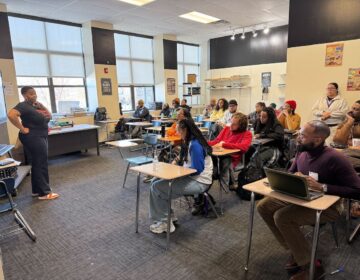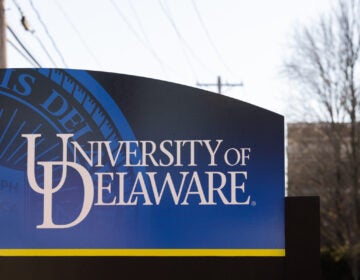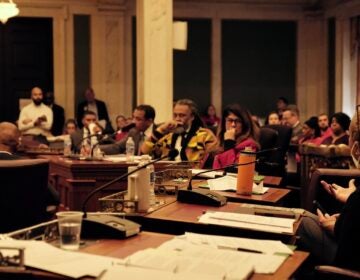Still short of funds, Philly School District turns its eyes to Harrisburg

State Capitol, Harrisburg, Pa. (Image courtesy of WikiMedia Commons)
Despite securing additional funding from City Council last week, the Philadelphia School District still faces a budget gap that threatens to strip its already bare-bones schools even closer to the core.
All eyes have now turned to the state Capitol.
Philly schools need $66 million just to provide students next year with this year’s admittedly “insufficient” resource levels.
That’s after selling buildings, getting principals to agree to less compensation, and leveraging City Council to borrow $57 million on its behalf.
If any more new revenue is going to come, it will have to be approved by the Republican-controlled, tax-averse state legislature.
“Everyone is definitely aware of the situation in Philadelphia,” said Stephen Miskin, spokesman of House majority leader Mike Turzai, R-Allegheny.
One of the big questions for the state is whether it will allow Philadelphia to place a $2 per-pack tax on cigarettes sold in the city.
Philadelphia City Council unanimously approved that tax a year ago, but it needs state approval to implement the tax.
City Council President Darrell Clarke met with GOP leaders including Turzai in Harrisburg Wednesday to continue his push for approval of the measure.
“It’s on the table.” Miskin said. “It’s not definitive, but, you know, we did have some good discussions.”
Erik Arneson, spokesman for Senate majority leader Dominic Pileggi, R-Delaware, added, “It’s late in the month to be saying this I know, but the discussions are still fairly preliminary at this point.”
Clarke said passage would likely require “horse trading and a little bit of bartering” on issues that typically divide along partisan lines.
The state, which faces a $1.4 billion budget shortfall of its own, is supposed to pass a budget by the end of the month.
Gov. Tom Corbett has said he wants the Legislature to cut the cost of public employee penions and modernize the state’s liquor stores before raising any taxes.
Many expect state lawmakers to debate these and other budget issues into July.
Clarke anticipates making “another trip or two before this is all over.”
If passed, lawmakers expect the cigarette tax to generate $40 million for schools next year and double that in years to come.
Other options being discussed by lawmakers for more school funding include implementing a severance tax on Marcellus shale drilling.
This, though, likely wouldn’t secure additional funding for Philadelphia schools, but merely secure the “Ready to Learn” block grants that Corbett requested in his proposed budget in February.
The Philadelphia School District has been counting on $29 million of this funding. Without an additional revenue mechanism, this funding could disappear – leaving the distict’s budget hole even larger.
Confidence in Mr. Hite
Ideally, on top of the $66 million needed to maintain the status quo, Superintendent William Hite says he needs an additional $224 million to implement his vision for systemic growth.
Hite argues that the state needs to recognize that, under his tenure, money is being well spent.
“Show me another agency across the commonwealth who’s closed 31 facilities, who has reduced its workforce by 5,000, who’s reduced its administrative spending under 3 percent and has had two concessionary labor contracts,” said Hite.
“I ask people to show me that, and they can’t. Why? Because no one else has done that,” he said. “And so people can talk about what has happened in the past, and what has not, but look at what we’ve had to do.”
Miskin said GOP leaders appreciate Hite’s record.
“There’s definitely more confidence in Mr. Hite and this SRC and the immediate previous one than there has been in many years,” Miskin said.
The district also continues to seek $95 million in concessions from the Philadelphia Federation of Teachers, whose contract expired in August.
WHYY is your source for fact-based, in-depth journalism and information. As a nonprofit organization, we rely on financial support from readers like you. Please give today.





